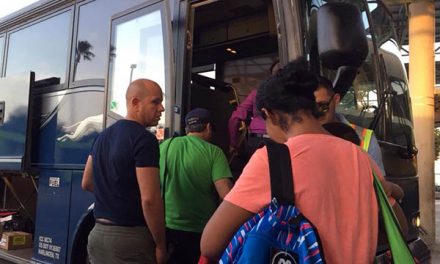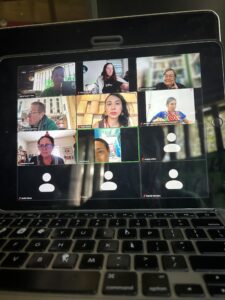 A group Feminist Elders Against Genocide FEAG) organized by elder feminists from the Maternal Gift Economy Movement to dialogue inter generationally about solidarity initiatives against genocide in order to develop solidarity efforts they are inviting speakers about campaigns against genocide in Gaza.
A group Feminist Elders Against Genocide FEAG) organized by elder feminists from the Maternal Gift Economy Movement to dialogue inter generationally about solidarity initiatives against genocide in order to develop solidarity efforts they are inviting speakers about campaigns against genocide in Gaza.
What FEAG has done so far:
- In FEAG’s first meeting last April 11, 2024, we invited the “Rapadas por Palestina” Global Campaign https://whatsapp.com/channel/0029VaU6bjXG8l5Jsl891P3Z
Cuban feminists who organized the Campaign spoke about the first 39 feminists from 12, counties have already joined. “This is an embodiment of solidarity with Palestinian women by cutting our hair the same way they have to do it because of lack of any conditions to care for their health, lives, children and communities” said Eva, one of the organizers.
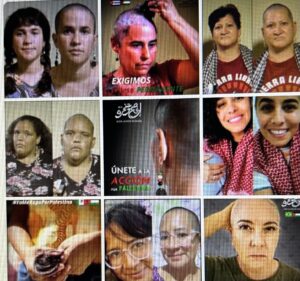
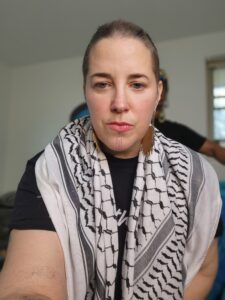
Alongside the Cubans, Mexican, costa rican and British women who cut their hair spoke about the reasons why feminists need to join in solidarity.
During the zoom solidarity gathering, FEAG feminist Heidi Howes and Lisa Hayes from the USA, cut her hair as also had co-moderator Maria Suárez Toro, also FEAG and from Puerto Rico.
https://www.facebook.com/share/v/Gnjtan3DLfEtLydZ/?mibextid=WC7FNe
2025 will see a 2 nd Call for October 7, 2025 which you can see here.
2. The second FEAG gathering was held last Thursday April 25,
featured two Middle East feminist advocates to an end to the genocide in Gaza:
One is Palestinian, Ramallah born, RaniaMadi specialist in International Human Rights Law who coordinates with Palestinian human rights organisations for the UN Human Rights Council, organising panels and side events relevant to the agenda of the Human Rights Council sessions.
It was important to listen to her and there is part that is relevant regarding why she has gone to present a case about violation of humanitarian assistance based on international legislation “because it aimed at ending impunity NOW, whereas the human right framework is about the aftermath of the war and in the reproductive genocide perspective, there won’t be anyone to protect.”
The other speaker was Bangaladeshi feminist scholar in solidarity with the Palestinian Women’s Collective about reproductive genocide, Nafisa Nipun. She has written a paper about the issue in Palestine. She is Associate Professor, Chair, Women’s, Gender, and Sexuality Studies Advisory Board, Department of Interdisciplinary Studies, Worcester State University.
Recommended reading also iwas Palestinian Feminist Collective here –
https://palestinianfeministcollective.org/the-pfc-condemns-reproductive-genocide-in-
Nafisa concentrated on the problemof a colonial feminism about reproductive justice for its fragmentation. She addressed reproductive genocide from the perspective of the Palestinian Feminist collective.
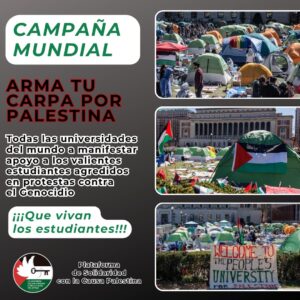
Her presentation developed how she and all the others in the Collective in the USA are “the professors behind the scenes” working with the young students generation who are expressing themselves in the university campus.
They teach their students a historical perpective that the generation does not have, and accompany them when they get in trouble for defending Palestine.
Discussion: even though most of us do nostalgic believe un can do much, and that they rights system is fragmented, we cannot leave ir in the hands of patriarchy and capitalismo … so our best bet in it is to struggle to reframe it looking holistically at what we are doing to each other and to the planet and hold accountable.
What this means about reproductive genocide is to bring an integrated perspective of the policy and an integrated perspective of the impact on the web of life. “Reproductive genocide – a term we learn from the Palestinian Feministas – can eventually hold Israel accountable to ALL aspects of the rights system… that way they cannot get away by fragmenting and we move the narrative to a holistic view of the genocide.
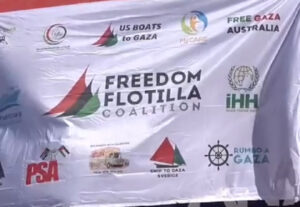
3. The third session took place next May 9, 2024.
Inn solidarity with the Flotilla of humanitarian initiative which we did by supporting it from afar, disseminating its events and the porpose in our communties.
https://www.instagram.com/reel/C6RWWpdoqjV/?igsh=Zm55NXBsd202OXdz
Solidarity against genocide by bringing attention and also humanitarian aid to breake the Israeli blockade is necessary!
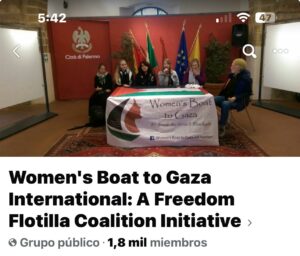
In August 2025 a massive flotilla is moving into Gaza, including a “Women’s Boat”
Thiago Avila, Saif Abukeshek, and Muhammad Nadir Al-Nuri; German human rights activist Yasemin Acar; American actress Susan Sarandon, Irish comedian and writer Tadhg Hickey and Spanish actor Eduard Fernandez, recipient of the 2025 National Film Award. The flotilla exceeds 20 boats and 300 people with activists from 44 different countries, with more boats scheduled to join them when they arrive in Tunisia on Thursday 4 September.
4. The fourth session took lace September 14, 2024,
consisting of a Special Session of the Maternal Gift Economy Movement.
Special Event – Genocide in Palestine is a Global Feminist Issue: Protecting the Web of Life, featuring Dra. Lila Sharif, Pilar Emitxin, Jodie Evans, Paola Melchiori, Peggy Antrobus, Pregs Govender, Maria Suarez Toro, and Genevieve Vaughan and moderated by Letecia Layson.
Addressing Reproductive Genocide, the core group of feminists 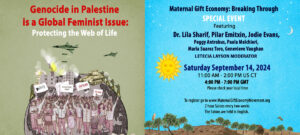 that put the initiative together decided to draft a summary of their core
that put the initiative together decided to draft a summary of their core
presentarions to distribute at events as they had so done towatds the
Anti Aprtheid Conference about Palestine in South Àfrica in May, 2024 where the core group was able to position the issue in panels.
The session featured first a presentation by Palestinian feminist Lila Sharif of the the Palestinian Feminist Collective (PFC), helping the audience understand the kind of genocide taking place in Palestine, characterized by the Collective as Reproductive Genocide in the “targeting of Palestinian individuals and communities in Gaza in what has become a condition of reproductive genocide, referred to the policies, discourses, and practices that delimit, restrict, target, or diminish the life-giving capacities, choices, access, short-term health, long-term health, and life chances of communities made vulnerable by systemic military violence and occupation, besiegement, settler colonialism, and/or imperial warfare.”
Following Leila Sharif’s presentation Caribbean, Latin American. US American and European feminists, working in solidarity with the Palestinian feminists in framing the narrative of the genocide from a feminist perspective of the PFC, will begin with the special presentation of two major solidarity initiatives: Pilar Emixtin (Argentina) of Global Feminist Action (GFA) on the Global South Feminist Assembly in Solidarity with Palestine and Jodie Evans (USA) of the CODEPINK activist initiative, challenging the US government policy regarding divestment, militarism and its support of Israel´s zionist policy to annihilate Palestine.
After their presentations, the three speakers will share a short dialogue about the meaning of solidarity from a global feminist perspective and will be followed by two respondents: Caribbean Peggy Anthrobus and European Paula Melchiori of the recently created Cross Generational Feminists in Global Solidarity with Palestine (CGS). https://www.codepink.org/914mge
5. The fifth action as developed by the feminist Core Group
of working on a statement about Reproductive Genocide as of September 2024
The core group emerged as a small international group of feminists from across the world working to articulate a specifically feminist perspective on the genocide in Gaza—one that goes beyond noting that “women and children are the majority of victims.” Inspired by the Palestinian Feminist Collective, a network of exiled activists and scholars, they focus on what they call “reproductive genocide”: the systematic attack on the reproduction of life itself. They have been drafting a “Feminist Gaze: Reproductive Genocide in Gaza”. The concept of Reproductive Genocide highlights how colonial projects target women and children to destroy future generations. It connects physical extermination with broader processes of erasure: the destruction of homes (domicide), schools and cultural memory (scholasticide), and social bonds (sophicide). It links daily control over food, medicine, water, and movement with policies of ethnic cleansing, incarceration, and sexual violence.
They put together a radio production for Radio France24 aired on September 28, 2024 with the core group presentations, including Leila Sharif, ros Patchesky of Jewish Voices for Peacde, Pilar Emixtin (Argentina) of Global Feminist Action (GFA) on the Global South Feminist Assembly in Solidarity with Palestine, Peggy Anthrobus and Paola Melchiori, all introduced by Maria Suarez Toro of FEAG.
6. The sixth session was an special meeting of FEAG group with Lama Khouri, October, 2024.
Palestinian-Jordanian psychoanalyst who lives on the stolen land of the Lenape people – New York. “In the context of reproductive genocide,mothering is an act of resistance.” In her article: Gaza’s Broken Lullaby: Genocidal Unchilding and the Impossibility of Mothering in Gaza.
She is a Psychoanalytic Supervisor and the Director of Diversity, Inclusion, and Belonging at the Institute for Expressive Analysis. Dr. Khouri co-founded the Palestine-Global Mental Health Network and sits on the Board of the Gaza Mental Health Foundation and Advisory Council of the USA-Palestine Mental Health Network boards. Her previous experience includes a 14-year career at the United Nations Department of Peace Operations.
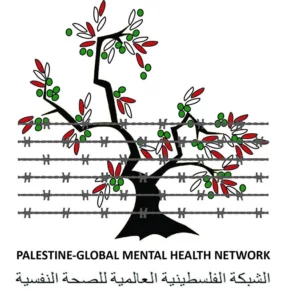
I hesitated a lot before I began to record this message because I approached it with a mix of trepidation and a profound sense of responsibility. I felt responsible because the act of speaking in such a forum, at this moment, carried the weight of history, grief, suffering, the screams of babies and mothers. I hesitated, wrote, and rewrote so many times what I would say. Finally, what I want to say crystalized in a moment in a cab ride to Brooklyn, where I was traveling to attend a Jewish Voice for Peace meeting. On that cab ride I received a message from a Bedouin mother in Jerusalem. Palestinian, she lives in the outskirts with her three children, all under the age of five. She often sends me pictures of them experiencing joy and playing in the middle of such terrible hardships. In the message she writes: “I had a dream. In the dream I urgently needed to send you the phone numbers of my relatives here in case I get killed so that you can take care of my children. In the dream – she continues – I ask myself why send it to Lama, if you have relatives here? But they might all be killed.”
We hear so many such stories, that pierce the soul and break the hearts that have already been broken so many times. This mother describes a pervasive sense of responsibility that one cannot discuss in textbooks or in theoretical frameworks. And in those moments, I am no longer a psychoanalyst or community organizer. I am a mother, a sister, a daughter and like all of us listening to this podcast, we are also all witnesses to a genocide live-streamed in real-time. The cruelty is unimaginable. Designed to mutilate. Parents forced to write their living children’s names on their limbs for identification in case they are killed and cut to pieces. Martyrs returned with their organs harvested. Families left helpless, their loved ones left to lie under the rubble because they are denied the tools to excavate their bodies. We are told that 70% of those killed in Gaza are children. There are reports that children are shot in their heads and chests, indicating clearly a ‘shoot to kill’ policy.
Why is that? Why do we see these things? The reason is that the Zionist project targets women and children in order to annihilate the future of the Palestinian nation. And in this environment, when the State is trying to make your life unbearable, mothering becomes an act of resistance. A refusal to surrender the basic hope of life under relentless oppression. I share this information but there is much more regarding the impact of settler colonialism on mothers and their abilities to be mothers that is difficult to convey with words. I have been trying to remember lullabies that I sang to my daughter Bianca and my son Paolo and that my mother and grandmother sang to me. Lullabies about love, tenderness and an undying promise of protection…
The settler colonial project shattered the lullaby. Words promising protection, safety and abundance are now empty and confusing for children. Children asking questions that they should not have to ask: “When I die, will I hear your voice?” “When the missiles hit our town, will I die right away?” “Will it hurt?” “When will I go back to school?” “Will my amputated hand grow back again?” “Will my friend, Muhammed, come back to life?” And the most heart-wrenching words came from a girl rescued from the rubble of her home: “Uncle, uncle, is this a dream or for real?”
How can I convey the profound sorrow and torment of a mother who hears her children’s cries of hunger? Or who sees her daughter become a skeletal shadow of herself, her gaze empty, her hair gone? How can I describe the incredible pain of a father clutching his wounded son and waving a white flag, cradling the same lifeless son’s body minutes later, killed by a sniper bullet? What is it like to hold the lifeless body of your five-year-old girl wrapped up in a white plastic bag? Yet we must talk about the unspeakable and incomprehensible. We must hope that our commitment to love and the fight for justice might bring a better future for oppressed people everywhere. Martin Luther King Jr. said once that “the arc of the moral universe is long, but it bends towards justice.” Truly, this phrase keeps me going. The liberation of our people in Palestine is certain. It is darkest before dawn and these times are very dark, but the dawn of justice and liberation is on the horizon and this dawn materializes in our anger, rage and organizing our resistance.
I’d like to close with a mantra I have been saying for the last 30 years: keep talking about Palestine, keep posting, keep disrupting, keep resisting and do not stop believing that Palestine will be free. We will return to our land, dance with the souls of our ancestors, and sing songs of freedom. As my dear friend Nadera Shalhoub Kevorkian often reminds me, “this is love and love is a practice of freedom.”
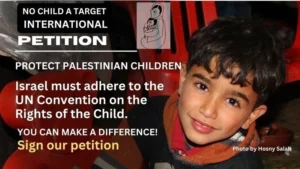
Very few women attended. Three. But Lama Khouri asked FEAG to help translate the Call by The Palestine Global Health Network (PGHN): “No Child Should Be a Target”
about the Children, which early on in the genocide let the world know what was comming for Palestinian children., which we translated, send it back to her and distributed it in Latina America and Csribbean for signatures.
7. The seventh action was the creation of a google list
Palestine is a Feminist Issue , creted on November, 2024.
The list, created by the Maternal Gift Economy Movemnt (MGEM) had as an objective to share relevant information that could inform our solidarity actions individually and as a group beyond and with FEAG. Frieda Werden of WINGS ans FEAG has kept it alive with relevant infotmation regarding the situation and the solidarity. It has the 15 active members in solidarity and has shared over 83 articles to 2025.
One such article is the february, 2025, when the UN Special Rapporteur on v101ence against women and girls,
Reem Alsalem, has said that the Israeli occupation army has used the k•lling of women and the targeting of reproductive health as tools for g-c1de in the Gaza Strip.
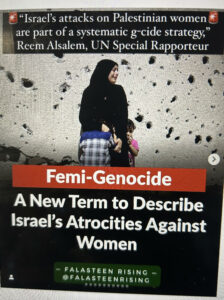
It was reported by the Palestinian Information Centre has reported. “Israel’s attacks on Palestinian women are part of a systematic g-cide strategy,” said Alsalem on Sunday. “When looking at Israel’s actions overall, it is clear that targeting the reproductive capacity of Palestinians in particular serves this purpose.”
The rapporteur emphasised that the k•lling of Palestinian women simply because they are women is a w@r cr1me and a crime against humanity, noting that the UN Convention on the Prevention and Punishment of the Crime of G-c1de also prohibits acts of g-c1de aimed at preventing reproduction within a group. “When we put all the pieces together, we find that the destruction of the health sector, leaving new-borns to their fate, and creating horrific conditions for pregnant and nursing women are all tools used in the Israeli genocidal violence targeting the total or partial destruction of the continuity of the Palestinian population,” said Alsalem.
She highlighted the devastating impact of the attacks on women and children, using data from the UN Population Fund. “Eight hundred thousand women have been forcibly displaced from their homes, and about one million women and girls are suffering from severe food insecurity. The situation in Gaza has reached dimensions unprecedented in modern history.”
Moreover, the UN official pointed out that the number of miscarriages has increased by 300 per cent due to inadequate medical care, psychological trauma and bombings. “This is not just about g-cide; it also means deliberate k•11ing and the complete destruction of the legal boundaries of war,” she added.
Source: ME Monitor / QNN, Date: February 3, 2025\
 Note by Escribana: Not quite the concept of Reproductive Genocide, as it only focues on what happens to women, it rhowever relates it to Reproductive Justice, a concept coined by many feminist groups to include what happenes to women in the genocide in Palestine.
Note by Escribana: Not quite the concept of Reproductive Genocide, as it only focues on what happens to women, it rhowever relates it to Reproductive Justice, a concept coined by many feminist groups to include what happenes to women in the genocide in Palestine.
Much different are the Reports by Special Rapporteur on Palestine, Fancesca Albaneese who focues on the overall relationships of all factors in the anhihilation of Palestine and the occupation of the devastated land, but she does not call it Reproductive genocide yet.
This is why FEAG is actively participating and promoting the nomination of Francesca Albanese for the Nobel Peace Award 2026 as promoted by the International Civil Rights Action Network.
General comment: Innlooking at what happened woelwide in the solidarity movements, many of the initiatives that are directly about solidarity wth Palestine appear relatively “on hold” and it seems to have evolved to that state after the end of the short lived cease fire and when Israel’s offensive in Gaza resumed full force. An analysis as to what happened to the movement is neccessary but it is also true that feminism and even womne’s agency in Palestinian resiliency and resistance also dissapeared .
8. On August 7, 2025, a meeting of the MGEN adopted a request by a member
to consider doing more in solidarity with Palestiones.
The proposal came from varios considerations: the devastating effect of the genocide in what seems like the adoption of a final solution by Israel and its allies, that despite the massive, growing solidatiry in all aspects of the reproductive genocide it has not been stop it, the amazing resiliency and resistance of Palestinians and the hihjacking of the international institutions by Israel and the United States at the UN, and the responsibility of the global feminist movements to connect all the dots about the type of genocide today in Gaza and bring a focus on Palestinian women’s agency and the victimization by the overall reproductive genocide.
Out of such concern and the need to do more, an initiativive was born to create a WEB page as a resource and instrument to tackle such responsibility by FEAG. To be posted here soon.

